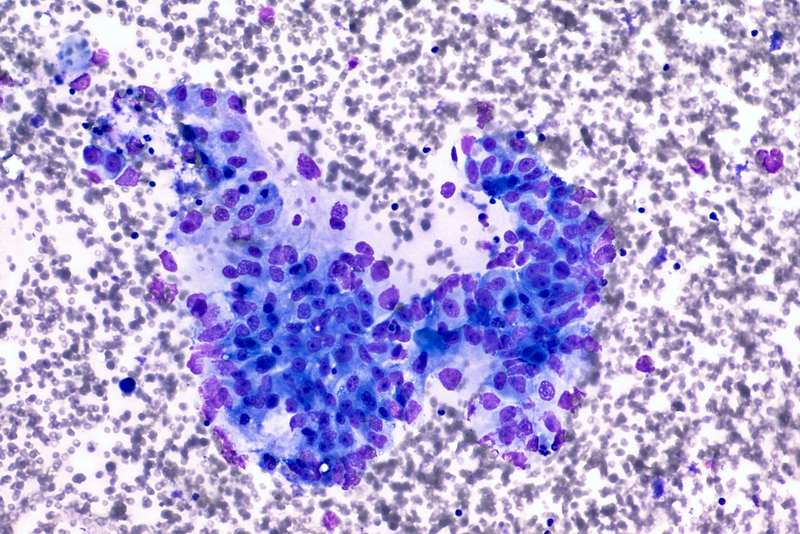For advanced pancreatic cancer, combining immunotherapies with chemotherapy shows early promise in reducing tumor size
Newswise Apr 03, 2019
Combining immunotherapy with chemotherapy shows promise for treating advanced pancreatic cancer, shrinking tumors in a majority of evaluable patients—20 out of 24—as of an interim analysis of phase 1b data from an ongoing trial.

The findings were being unveiled on March 31, 2019, at the American Association for Cancer Research (AACR) 2019 Annual Meeting in Atlanta, GA. Parker Institute for Cancer Immunotherapy (PICI) researchers at the University of Pennsylvania presented the results on behalf of PICI investigators from seven institutions where the study is being conducted.
The strategy involves tackling the tough-to-treat tumor with a three-pronged attack using standard-of-care chemotherapy plus two types of immunotherapy: an experimental CD40 antibody designed to rev up the immune system and PD-1 checkpoint inhibitor that takes the brakes off the immune system.
“The idea is to attack the cancer from different angles. Although the results are early, we see encouraging signs that anti-CD40 immunotherapy, checkpoint inhibition, and chemotherapy in combination could be an effective new approach to treat patients with metastatic pancreatic cancer,” said senior author, Robert H. Vonderheide, MD, DPhil, a PICI investigator, member of the Cancer Research Institute (CRI) Clinical Accelerator leadership, and director of the Abramson Cancer Center of the University of Pennsylvania.
The Parker Institute holds the Investigational New Drug application from the US Food and Drug Administration.
Pancreatic cancer is now the third leading cause of cancer-related deaths in the United States, according to the American Cancer Society. The National Cancer Institute reports the disease killed approximately 44,330 people in the United States in 2018. Pancreatic ductal adenocarcinoma (PDAC) is the most common form.
While clinical trials of immunotherapy alone have yielded few positive results against this type of cancer, pre-clinical work done in Dr. Vonderheide’s research laboratory suggested that adding a CD40 antibody to checkpoint inhibition and chemotherapy might work synergistically against the tumor.
Based on that research, the San Francisco, CA-based Parker Institute, in partnership with CRI, brought together nonprofit, biotech, and pharma partners to test this novel combination in a clinical trial. It was first developed as part of the Parker Institute’s clinical collaboration with CRI, Bristol-Myers Squibb Company (BMS), and Apexigen, Inc., that launched in 2017. The speed with which the trial opened and is yielding results illustrates that the Parker Institute’s collaborative model can successfully foster the development of faster, more efficient multi-center studies.
“We are very excited about the encouraging data so far, especially because metastatic pancreatic cancer has a 5-year survival rate of less than 9%, making it an area of high unmet medical need,” said the Parker Institute’s Chief Medical Officer Ramy Ibrahim, MD.
The results also offer an indication that this type of combination approach could work not only for pancreatic cancer but also other types of tumors where immunotherapy has not proven successful yet.
“What we learn in this trial can inform the work being done on other solid tumor types, so that we can make immunotherapy beneficial for more patients,” Dr. Ibrahim said. “We could not have gotten this far without our partners and PICI’s unique collaborative infrastructure, which allows us to be nimble and follow the science.”
In the study, untreated metastatic PDAC patients received combinations of the different therapies. All patients were treated with a combination of gemcitabine and nab-paclitaxel, a standard-of-care chemotherapy regimen, as well as the CD40 agonistic antibody, APX005M, from Apexigen. Half the patients also received the PD-1 inhibitor nivolumab from BMS.
The phase 1 portion of the trial was designed to evaluate the safety of using four drugs in combination. While a majority of patients experienced some side effects, several patients remained on treatment for about a year, indicating that the combination was well-tolerated and capable of inducing a durable response.
“Compared with most other cancers, pancreatic cancer has a challenging prognosis, so to see patients continuing on the same treatment for a year and beyond is very promising,” said Eileen M. O’Reilly, MD, co-lead author of the study and associate director for clinical research at the David M. Rubenstein Center for Pancreatic Cancer at Memorial Sloan Kettering Cancer Center. Based on the initial study results, the trial has continued to phase 2.
“These results further validate our belief that our CD40 agonist APX005M plays a critical role in activating both innate and adaptive immunities, so that the immune system can more effectively fight cancer,” said co-author Ovid Trifan, MD, PhD, chief medical officer of Apexigen. “We are excited to see additional results from the next phase.”
The results are a welcome sign of hope for patients with pancreatic cancer, which does not always receive the attention or funding of other cancer types.
“There are more than 2,600 clinical trials looking at PD-1/L1 combinations to treat cancers, but only 89 of them are for pancreatic cancer vs 535 for lung cancer,” said Vanessa Lucey, PhD, a co-author of the study and director of the Cancer Research Institute Clinical Accelerator. “Considering that pancreatic cancer is expected to be the second leading killer in the United States by 2025, it highlights how much work is to be done to make progress for patients, which is exactly why we at CRI chose to help support this trial."
In addition to reporting on clinical outcomes in the future, PICI is collecting and analyzing comprehensive biomarker data from tissue and blood samples during the trial. Researchers aim to utilize the imaging, sequencing, and single cell data analyses to paint a richer portrait of a patient’s immune system so that scientists can figure out why a patient may or may not respond to the combination therapy.
-
Exclusive Write-ups & Webinars by KOLs
-
Daily Quiz by specialty
-
Paid Market Research Surveys
-
Case discussions, News & Journals' summaries